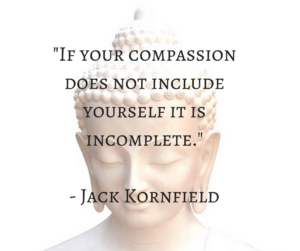Imagine what you do when you have compassion for a friend. You may try to put yourself in their shoes and imagine what they must be feeling. You would recognize their suffering and would probably help them feel better. This may include extending help, kind words, and providing reassurance that things will be okay and that they are doing the best they can. You may take them out for ice cream or a movie, or bring them a warm meal because they are going through a hard time. You may help soothe them and offer other points of view and alternatives to their problem. Sounds pretty natural, right?
It is pretty easy for most of us to have compassion for others. It is harder to extend that level of kindness and compassion to ourselves. For example, many clients struggle with their “inner bully”.
I see this pattern with clients and often have them work on “silencing their inner bully”. This is the inner voice that says things like “you didn’t do enough”, “see how stupid you are”, “why didn’t you do better?” or “I am a failure because….”. While some level of honesty regarding ourselves helps us become better in our personal and professional relationships, many times it can be excessive. This inner critic self-dialogue also contributes to more stress and suffering. For example, those with depression, anxiety, and low self-esteem have continual inner dialogues of self-criticism. It is what they are saying to themselves that often makes them feel worse. Self-compassion researchers state if you are able can recognize your inner dialogue and intervene, you may help alleviate your suffering.
How can Self-Compassion Help Me?
According to the pioneer of self- compassion research Dr. Kristin Neff, self-compassion is extending that same level of understanding and kindness to yourself when you make a mistake or think you failed at something. It is bringing awareness to your own internal process and self-criticism. It is stopping and asking “Wait, how can I care for myself at this moment”? It is about raising awareness and stopping the tendency to judge yourself for shortcomings and areas you feel inadequate. Just as if someone was talking down about your friend you may say “Hey, that’s my friend you are talking about!”. It is extending that same level of protection and kindness toward yourself. We can be our own worst enemies and can criticize ourselves much more than others would. Often, negative self-talk begins in childhood and may mirror what you have seen and heard from parents and caregivers. Unfortunately, this pattern can extend into adulthood without much awareness regarding self-critical thoughts. For example, how many self-critical thoughts do you have in a week? A day? An hour? If you pay attention, it may be more often than you realize.

Research
Research supports there are several benefits to practicing self-compassion. They include decreased depression, anxiety, PTSD/trauma symptoms, anger, and body shame. Self-compassion is also associated with increased emotional resilience; the ability to bounce back from adversity. Researchers have found that practicing self-compassion can create stable and continual changes in mental health symptoms including decreased depression and increased happiness (Mongrain et al., 2010) and that it is inversely associated with psychopathology in general (Neff, 2016). Studies have shown that trait levels of self-compassion are linked to areas of well-being such as greater levels of happiness, life satisfaction, and body appreciation (Neff, 2017). Although some people may naturally possess higher traits, you too can learn to apply self-compassion by practicing with exercises.
How Can I Be More Self- Compassionate?
- Become aware of your inner critic. When you notice your self-critical thoughts like “I am a failure”, “I am such an idiot” or “Noone likes me”. Pause and intervene with thought stopping (picture a stop sign) and replace it with another thought. What would you say to your friend if you heard them saying these things aloud? Perhaps something like “you are being too hard on yourself”, “you are not alone in this”, “these things happen to the best of us” or “you did your best”.
- Take a self-compassion break! Guided meditations such as affectionate breathing, loving kindness mediation, or a 5-minute self-compassionate break are available in mp3 format on www. self-compassion. org.
- Realize your suffering is a part of collective suffering. According to Neff, understanding that suffering is a part of common humanity versus your own isolated experience may help you put things into perspective and feel more connected. Understand that although you may feel you are the only one suffering from this issue, you are not. If you can keep things into perspective that every person suffers or has their own “cross to bear” so to speak. Suffering and pain are a part of the human experience.
- Try not to over-identify with your negative emotions by using mindfulness. According to Neff, it is important to have a balanced approach to your negative emotions and not to become “swept away by them”. Mindfulness is a receptive mind state where one observes thoughts and feelings as they are without suppressing or denying them. This state helps you become mindful of your negative emotions and keep them in a balanced perspective. Several exercises can help with this process (see www.self-compassion.org.)
As Jack Kornfield stated, your compassion is not complete unless it includes yourself. Hopefully, by reading this blog you can begin to understand your own inner dialogue and care for yourself as you would a loved one. You may feel less anxious, depressed, and stressed as a result!
Would you like to learn more? Contact Dr. Tracy Hutchinson today »
Resources:
- Hutchinson, T. & Leppma, M. (2018). Self-Compassion: Benefits to Therapists and Clients: EB-ACA conference, Athens, Greece.
- Neff, K. D., Kirkpatrick, K. L., & Rude, S. (2007). Self-compassion and adaptive psychological functioning. Journal of Research in Personality, 41(1), 139-154.
- Neff, K.D. & Germer, C. (20147). Oxford Handbook of Compassion Science. Self-Compassion and Psychological Wellbeing.
- https://self-compassion.org/




